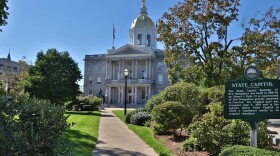The five main Republican candidates vying to take on Democratic Sen. Maggie Hassan met in a radio debate Tuesday hosted by Binnie Media. With less than a month until primary voters head to the polls, the candidates weighed in on topics ranging from President Trump, to education, the economy and climate change.
Here are three takeaways about the state of the GOP primary campaign:
Insiders v. outsiders remains a key dynamic in this race
New Hampshire Senate President Chuck Morse is the closest thing this race has to an insider, albeit one who remains not widely known outside Concord, where he’s served in the Legislature for two decades, or his hometown of Salem. Morse has tried to keep this race focused on Hassan, but has thus far failed to excite primary voters. In Tuesday’s deabte, he worked to remind voters what Republicans have done on his watch in the State House, from cutting taxes, to loosening gun laws, to adding abortion restrictions.
“And all of that was with Gov. Sununu,” Morse noted.
Former Londonderry Town Manager Kevin Smith, a social conservative who ran for governor in 2012 and has worked in and around government his whole career, is also a known factor to the GOP establishment. But his campaign has also struggled to attract clear activist support.
If polls are to be believed, Morse and Smith both trailing retired Army Gen. Don Bolduc, who’s drawn minimal backing from political donors but who’s campaigned pretty much nonstop since he lost the 2020 Senate primary.
“I am an outsider. I understand your anger. I understand you’re upset, I understand your concern. I understand your worry,” Bolduc said at the debate’s close.
This was after a performance in which he called out what he called Sununu’s “executive overreach, everything he did in COVID to hurt Granite Staters,” and reiterated past claims that his candidacy drove Sununu’s decision to not seek Hassan’s Senate seat himself.
Smith, meanwhile, criticized what he termed Bolduc’s “shoot, ready, aim” approach, which has included Bolduc alleging, without evidence, that Sununu is a “Communist Chinese sympathizer.”
“We need serious people running for this seat to be elected to the United States Senate,” Smith said.
Bitcoin investor Bruce Fenton, meanwhile, repeatedly made the case that what New Hampshire needs is someone willing to fight what he sees as tyranny at all costs. When asked about how to incentivize more interest in public service, Fenton dismissed the thrust of the question.
““I think it’s great that people don't want to work for the man, and work for the system that is completely broken, that has abused so many of us and cost so many lives,” Fenton said. “I hope we go from a million federal employees down to 10,000 or so."
On core policy questions, there’s not much disagreement among the field
The candidates agreed that pocketbook issues are voters’ key concern.
“Let’s be very clear about this: This race is about the economy and inflation,” Morse said.
The Republicans also were in lockstep when it came to the need to reduce federal spending. And they all said they agreed with the state’s newly enacted 24-week abortion ban.
They also all downplayed the effects of climate change, which they said Democrats had prioritized over other needs, including domestic oil production.
“Climate change has become a religion with these folks,” Smith.
The Republicans also criticized what they see as the politicization and policing of views in public schools and policies around diversity.
“The identity politics is ripping this country apart,” said Vikram Mansharamani, a businessman who lives in Lincoln and who claims his decision to seek office as a Republican cost him a lecturing position at Harvard, which Mansharamani characterized as his being “canceled.”
Former President Donald Trump remains a factor in this race
Some of this debate’s most delicate positioning had to do with former President Trump.
A questions about the FBI search of Trump’s Florida estate led off the debate: All the candidates criticized the raid, some more pointedly than others
More interesting, however, were the candidates’ responses when asked if they wanted Trump to run again for president in 2024.
None expressly said they hoped he would run.
“You are asking me to make a choice, for instance, if I like an apple, when maybe I like an orange,” Mansharamani said.
“Anyone who’s going to run with Donald Trump’s policies that he had in place as president, I support,” Morse said.
The candidates were of a mind though, when asked by the debate’s moderator, Jack Heath, about accepting Trump’s endorsement.
“Anyone not want the endorsement of Donald Trump?” Heath said.
“Ok, it’s quiet,” Heath noted.








